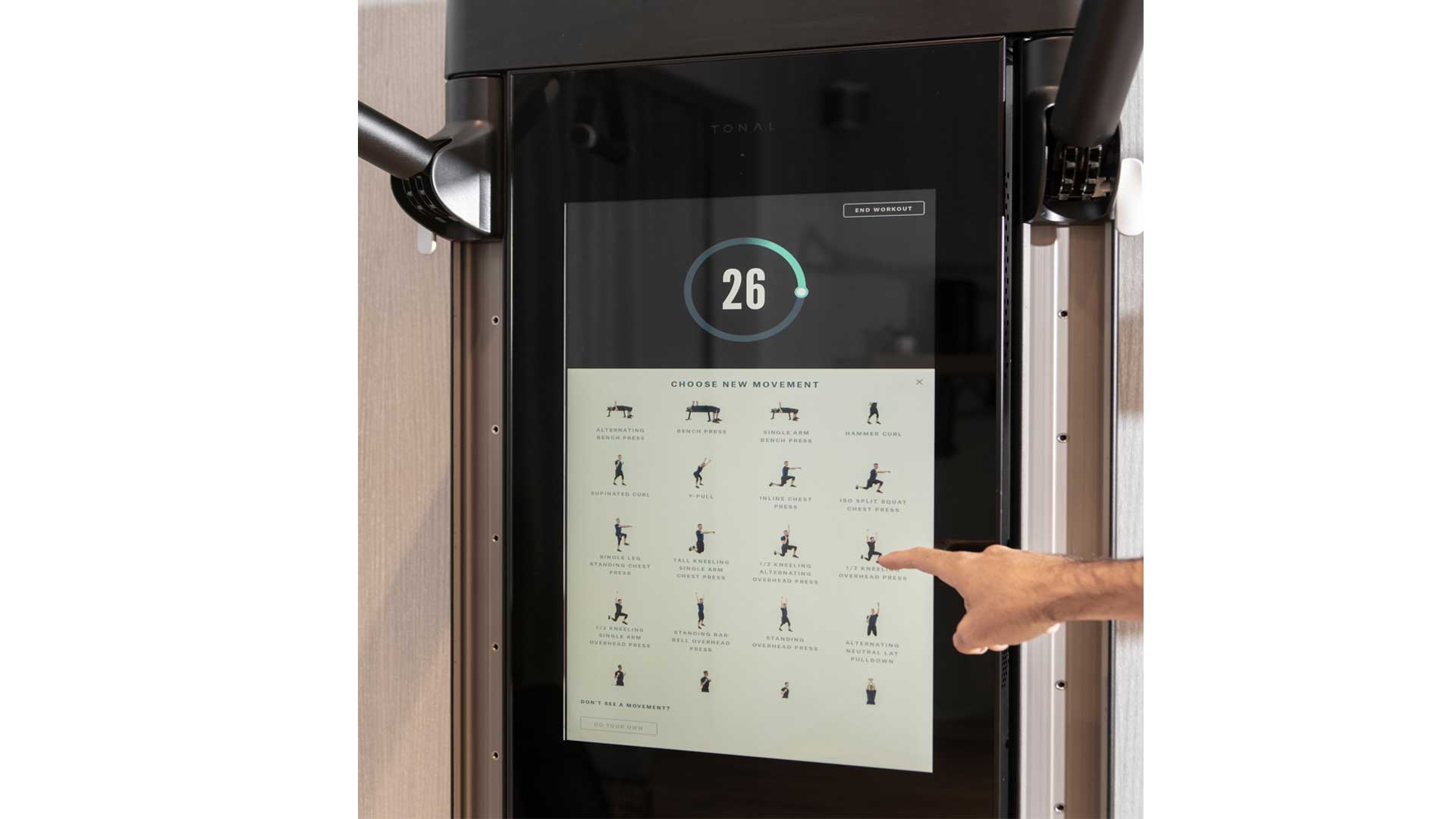





Class timetables that don’t fit your schedule, the hassle of lugging workout clothes on your commute and the additional time of travelling to and from your chosen fitness centre; there are multiple excuses that stop us going to the gym. But new technology is negating these excuses by bringing gym classes and equipment into the comfort of people’s living rooms.
Global Market Insights reported that the fitness equipment market was valued at over $10 billion in 2017 and estimated a 4% compounded annual growth rate from 2018 to 2024. While fitness centres and gyms are continually upgrading their equipment to improve their user experience, significant contributors to this market growth are companies such as Pelaton, Tonal, and Mirror, who are not only revolutionising the at-home fitness market, but disrupting the bricks and mortar experience of gyms.
Advert introducing Tonal
In recent years, fitness instructors have amassed enormous global followings as a result of this shift towards home exercising. Backed by millions of dollars of venture funding, workouts have become more readily available than ever as they’re streamed directly to customers’ homes, and highly personalised exercise classes can now be based on individual performance. Pelaton, and 2018’s addition, Pelaton Tread, stream workouts directly to the screen attached to their stationary bikes and treadmills, giving customers access to their studio classes, and the accompanying community of users, from the comfort of their living rooms. Similarly, Mirror streams classes on its part-mirror, part LCD screen in a range of disciplines, taking you through classes step by step. Meanwhile, Tonal uses electromagnetism to simulate and control weight in its interactive, wall-mounted, strength training machine. Though differing in their delivery, these companies and their competitors all share one common theme: the desire to deliver personalised, content-driven home workouts using cutting-edge technology.
Great claims have been made by the founders of these companies regarding the impact of their products. Tonal’s CEO, Aly Orady asserts that ‘we’re fundamentally reinventing strength training’, while Brynn Putnam, founder and chief executive of Mirror, sets out the ambitious goal to be ‘the next screen in people’s lives’. In order for these companies to achieve such impressive aspirations, we need to examine the premise of these innovations: what is the true impact of technology in this space?

Example of Tonal’s interactive LED screen
Convenience
The undeniable ‘slam dunk’ for technological at-home workout products is convenience. Ultimately, working out at home benefits consumers by removing travel time, extra luggage, and the constraints of studio timetables. Rolling out of bed and being showered and ready for work by 7am, having already completed your cardio/strength training/stretching, is an increasingly attractive prospect for the time-poor target audience of this equipment. Certainly, home workout equipment facilitates this, but the critical differentiator between technological workout products and your average $400 Black Friday treadmill is the content possibilities.
Content
As customers become savvier to the potential of technology, the appetite for high-quality, tailored content grows. This can be seen across all platforms and verticals, and the fitness industry is no exception. Artificial intelligence has been used to deliver workout recommendations and training programmes, including assigning weight categories and effort estimates based upon the quality of a users’ live performance and the trajectory of their past performance. And these levels of personalisation can only increase. As the technology develops and more users engage with such platforms, these personalised exercise programmes will have access to richer data, becoming increasingly more robust and developed.
Connection
High definition LCD screens bring the premium fitness brand experience to life for consumers who cannot attend physical studio classes, whether this be due to time constraints or geographical limitations. Communities now exists in their thousands rather than tens through the live streaming of classes as technology widens the pool of brand advocates beyond anything a bricks and mortar gym could ever hope to achieve. Instructors are able to access an unprecedented number of customers and, in turn, foster a cult-like status that serves to feed directly back into the brand equity. Jason from small town suburbia can now access the same calibre trainer as Annie from the big city (caveated with the assumption that both can afford the rather steep upfront and ongoing subscription costs). Far from technology replacing human connection, these platforms actively support and encourage a social community of users through social media groups, leader boards, and virtual ‘high fives’ during workouts. This is a clear benefit to both consumers and the companies themselves; FightCamp, which markets itself as ‘a full studio boxing gym in your home’, saw community engagement increase by 239% after the introduction of their leader board feature.
Video showcasing FightCamp
Any criticisms of this field often centre around the notion of ‘technology for technology’s sake’. In the instance of the fitness industry though, rather than a gimmick, these companies are taking the workout experience to its most unrestrained form. The success of this technology lies, in part, in the systematic removal of our go-to excuses for not working out. Here, exercise has been stripped of its temporal, logistical and geographical constraints to deliver a product that invalidates your excuses. As further research and development continues to be done in this arena, concerns such as data privacy, excessive screen time, and lack of ‘real’ social interaction will undoubtedly arise, but companies will have to be prepared to address these when the time comes.



Our dedicated team dives deep, delivering relentless value and aligning digital solutions with your goals in a way that guarantees success
Learn more